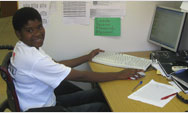Providing basic health care and information to pregnant women is a struggle in Mozambique, a poor country twice the size of California where sixteen years of civil war severely disrupted government services. More than a decade after the war ended, medical facilities and trained personnel available to staff them remain in short supply, especially in rural areas.
Natural disasters compound the challenge, displacing people who already have few resources and damaging the fragile health network that exists. When central Mozambique’s Zambezi River flooded its banks in 2001, thousands of nearby residents fled to higher ground in Chupanga, a once-tiny community of huts built around an abandoned church that became a town almost overnight.
|
|
Three years after the flood, only one male nurse was available to provide health services to the entire Chupanga area, staffing a basic government health post that is housed in a tent. The nurse had no other day-to-day help - even with tasks like laundry. Women from the community decided, on their own initiative, to start a female-run birthing service at the health post. They asked for and received training to make their idea a reality. In 2002, a USAID-funded program trained twenty-three women as community health promoters in Chupanga.
In rural Mozambique, USAID provides on-going funding for improved access to health services, which includes training local women to reduce the number of maternal and infant deaths. Most trainees, selected by local community leaders, were married women whose families survive by subsistence farming. Their role is to teach other women about healthy pregnancy and childbirth, as well as to encourage them to use the local health post for pre- and post-natal care and deliveries.
In addition, the volunteer health educators learned that pregnant women were upset by the fact that the health post’s only staff person was a man, and they refused to go. As one woman said, “I prefer to give birth at home than to be attended by a man while giving birth.” As a result of USAID’s program, pregnant women in Chupanga and surrounding areas no longer shun the health post. Two female volunteer birth assistants are on duty 24 hours- a-day to help deliver the community’s children. During the day, they remain at the tented health post’s maternity unit, providing pre- and post-natal care, carrying water, washing linen, and cleaning the facility.
When complications arise during a delivery, the volunteers find transportation to take the woman to the rural hospital in Marromeu. The founders of the service are proud to report they now assist on an average of twenty-three births each month. There are fewer obstetric emergencies because the volunteers identify potential problems early. And women no longer feel they must choose between traveling fifty miles to the nearest hospital or risk giving birth at home. Due to programs like the one in Chupanga, nearly 85% of women in the six provinces funded by USAID received pre-natal care during their last pregnancy.
|


